
Progress in Artificial Intelligence
Scope & Guideline
Charting New Territories in AI Research
Introduction
Aims and Scopes
- Machine Learning and Deep Learning Techniques:
The journal covers a wide array of machine learning and deep learning methodologies, including supervised and unsupervised learning, reinforcement learning, and hybrid models. This encompasses applications in medical diagnostics, image processing, and predictive analytics. - Healthcare Applications:
A significant portion of the research published addresses healthcare challenges, utilizing AI for disease diagnosis, patient monitoring, and treatment prediction, thereby contributing to improved healthcare outcomes. - Optimization Algorithms:
The journal also focuses on optimization techniques, such as evolutionary algorithms and swarm intelligence, applied to solve complex problems in various fields including engineering, finance, and logistics. - Interdisciplinary Applications:
Research often spans multiple disciplines, showcasing AI's versatility in areas like robotics, environmental science, and social sciences, highlighting its role in solving diverse real-world problems. - Explainability and Ethics in AI:
There is a growing emphasis on the explainability of AI models and ethical considerations in AI applications, reflecting the journal's commitment to responsible AI development.
Trending and Emerging
- Self-Supervised Learning:
There is a growing trend towards self-supervised learning techniques, which allow models to learn from unlabeled data, enhancing their efficiency and applicability in real-world scenarios. - Explainable AI (XAI):
The emphasis on explainability in AI is increasing, with researchers focusing on developing models that provide insights into their decision-making processes, which is crucial for trust and transparency. - Federated Learning:
Federated learning is gaining traction as a method for training AI models across decentralized data sources while preserving privacy, reflecting the increasing importance of data security in AI applications. - AI in Mental Health and Social Media Analysis:
Research focusing on AI applications in mental health, particularly through social media data analysis for suicide ideation detection, is emerging as a significant area due to its societal relevance. - Integration of AI with IoT:
The convergence of AI with Internet of Things (IoT) technologies is becoming a prominent theme, with studies exploring cognitive IoT systems that enhance automated decision-making and predictive capabilities.
Declining or Waning
- Traditional Statistical Methods:
There appears to be a waning interest in purely traditional statistical methods without integration with machine learning techniques, as more researchers favor advanced AI methodologies for data analysis. - Basic Classification Models:
The focus on basic classification models has declined, with researchers increasingly opting for more sophisticated, hybrid models that incorporate deep learning and ensemble techniques. - Rule-Based Systems:
Research on traditional rule-based systems has decreased, likely due to the rise of data-driven approaches that provide more flexibility and adaptability in problem-solving. - Narrow AI Applications:
There is a noticeable reduction in studies centered around narrow AI applications, as the field shifts towards generalizable and robust AI systems capable of handling more complex and varied tasks. - Single-Domain Focus Studies:
Papers that focus solely on a single domain without interdisciplinary connections are less frequent, as the trend moves towards multidisciplinary approaches that leverage AI across various sectors.
Similar Journals
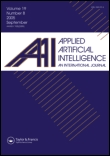
APPLIED ARTIFICIAL INTELLIGENCE
Bridging Theory and Practice in AI ApplicationsAPPLIED ARTIFICIAL INTELLIGENCE, an esteemed journal published by Taylor & Francis Inc, serves as a vital platform for sharing groundbreaking research and advancements in the field of artificial intelligence. With an E-ISSN of 1087-6545, this Open Access journal since 2022, offers scholars the opportunity to disseminate their findings widely, increasing visibility and accessibility in the academic community. With a history dating back to 1987, the journal features a compelling Q3 category ranking in Artificial Intelligence and holds respectable placement in Scopus rankings, emphasizing its relevance and contribution to both Electrical and Electronic Engineering and Computer Science. Targeted at researchers, industry professionals, and students, APPLIED ARTIFICIAL INTELLIGENCE is dedicated to promoting innovation and fostering dialogue on the practical applications of AI technologies, making it an indispensable resource for anyone striving to advance their knowledge and expertise in this rapidly evolving domain.
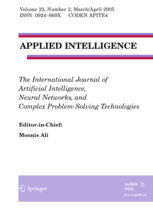
APPLIED INTELLIGENCE
Advancing the frontiers of Artificial Intelligence applications.Applied Intelligence is a prominent peer-reviewed journal that has been instrumental in advancing the field of Artificial Intelligence since its inception in 1991. Published by Springer, a reputable name in academic publishing, the journal focuses on the innovative applications of intelligent systems, algorithms, and methodologies across various disciplines. With an impressive Q2 ranking in the Artificial Intelligence category for 2023, and a Scopus rank of #117 out of 350 in its field, Applied Intelligence is recognized for its significant contributions and rigorous standards. The journal is accessed primarily through subscription, ensuring that high-quality research reaches the academic community and industry professionals alike. Its commitment to disseminating cutting-edge research makes it an invaluable resource for researchers, practitioners, and students interested in the practical implications of AI advancements. Join a community dedicated to exploring the transformative power of artificial intelligence and stay ahead in this ever-evolving field!
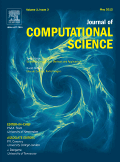
Journal of Computational Science
Transforming Ideas into Computational SolutionsThe Journal of Computational Science, published by Elsevier, is a premier academic journal that serves as a vital platform for researchers and professionals in the fields of computer science, modeling, and simulation. With an ISSN of 1877-7503 and an E-ISSN of 1877-7511, this journal focuses on the latest advances in computational methodologies and their applications, fostering interdisciplinary dialogue and collaboration. As of 2023, it holds an impressive Q2 ranking in multiple categories, including Computer Science (miscellaneous), Modeling and Simulation, and Theoretical Computer Science, showcasing its relevance and impact within the scholarly community. The journal features comprehensive research articles, reviews, and case studies that contribute significantly to the understanding and development of computational techniques. With its high standing in Scopus rankings, including a 79th percentile ranking in Mathematics - Modeling and Simulation, the Journal of Computational Science is an essential resource for anyone seeking to advance their knowledge and research in this dynamic field.
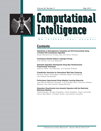
COMPUTATIONAL INTELLIGENCE
Elevating Knowledge in Computational Intelligence and BeyondCOMPUTATIONAL INTELLIGENCE is a prestigious, peer-reviewed journal published by Wiley, dedicated to advancing the field of artificial intelligence and computational mathematics since its inception in 1985. With an impressive track record reflected in its Q2 ranking in both the Artificial Intelligence and Computational Mathematics categories for 2023, this journal is a leading resource for researchers, professionals, and students seeking to explore cutting-edge methodologies, theories, and applications that underpin computational intelligence. The journal is indexed in Scopus, holding a remarkable rank of 18/189 in Computational Mathematics, placing it in the top 10% of its field, and ranks 111/350 in Artificial Intelligence. Although it does not offer open access, articles are readily accessible for institutions, ensuring a wide outreach within the academic community. With its commitment to fostering innovation and critical thought, COMPUTATIONAL INTELLIGENCE continues to be an essential platform for disseminating high-quality research that shapes the future of technology and mathematics.
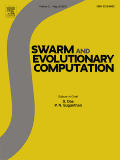
Swarm and Evolutionary Computation
Advancing Algorithms for a Smarter Future.Swarm and Evolutionary Computation is an esteemed academic journal published by Elsevier, dedicated to the exploration of innovative algorithms and methodologies derived from principles of swarm intelligence and evolutionary computation. With its ISSN 2210-6502 and E-ISSN 2210-6510, this journal has earned a prominent position in the field, evidenced by its Q1 category rankings in both Computer Science and Mathematics for 2023, reflecting its high impact and relevance. The journal's Scopus rankings further underscore its significance, placing it in the top percentile of mathematics and computer science journals. As an open-access platform, it aims to disseminate groundbreaking research that addresses real-world challenges and fosters interdisciplinary collaboration. Researchers, professionals, and students are encouraged to engage with this journal to contribute to and benefit from the ongoing advancements in swarm intelligence and evolutionary methods, which have become instrumental in solving complex optimization problems across diverse fields.
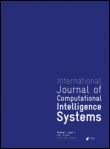
International Journal of Computational Intelligence Systems
Empowering the Future through Open-Access ResearchInternational Journal of Computational Intelligence Systems, published by SPRINGERNATURE, is a leading open-access journal that has been at the forefront of research in the field of computational intelligence since 2008. With an ISSN of 1875-6891 and an E-ISSN of 1875-6883, this journal occupies a prominent place in the academic landscape, achieving impressive rankings in its categories: Q2 in both Computational Mathematics and Computer Science (miscellaneous), reflecting its significance and relevance to researchers, professionals, and students. Based in Switzerland, the journal is committed to disseminating high-quality research and fostering innovation in computational methodologies, algorithms, and applications. Its strong impact factor and Scopus rankings—31/189 in Computational Mathematics and 53/232 in General Computer Science—underscore its critical role in advancing knowledge in these interdisciplinary fields. As an open-access journal, it provides unparalleled accessibility to cutting-edge research, supporting the global community in staying at the forefront of computational intelligence advancements.

Quantum Machine Intelligence
Transforming theoretical insights into practical quantum applications.Quantum Machine Intelligence is a leading academic journal published by Springer Nature, focusing on the rapidly evolving intersection of quantum computing and artificial intelligence. With an impressive impact factor reflected in its prestigious ranking in various categories—Q1 in Applied Mathematics, Computational Theory and Mathematics, and Theoretical Computer Science, alongside Q2 in Artificial Intelligence and Software—this journal serves as a vital platform for disseminating innovative research from 2019 to 2024. Researchers, professionals, and students are encouraged to engage with the journal’s content, which features high-quality peer-reviewed articles that explore theoretical foundations and practical applications of quantum technologies in machine intelligence. Although the journal operates under traditional subscription models, it is committed to advancing open academic discourse and accessibility in the digital age. With Scopus rankings that place it among the top echelons of its fields, the journal is an essential resource for anyone interested in the transformative potential of quantum algorithms and AI.

Frontiers in Robotics and AI
Elevating Research Standards in Robotics and AIFrontiers in Robotics and AI is a leading journal dedicated to the exploration and dissemination of groundbreaking research in the fields of robotics and artificial intelligence. Published by FRONTIERS MEDIA SA in Switzerland, it has established itself as a vital resource for academics, professionals, and students since its inception in 2014. With an impressive Open Access model, the journal ensures that high-quality research is accessible to a global audience, fostering collaboration and innovation. The journal is recognized for its distinguished impact in the academic community, achieving Q2 quartile rankings in both Artificial Intelligence and Computer Science Applications as of 2023. It currently holds a solid position in Scopus rankings, with a rank of #123 out of 350 in Artificial Intelligence and #223 out of 817 in Computer Science Applications, reflecting its robust contribution to these dynamic disciplines. The journal's scope encompasses a wide range of topics, including but not limited to autonomous systems, machine learning, and human-robot interaction, making it an essential platform for innovative ideas and advanced research.
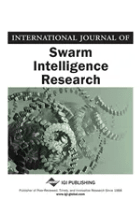
International Journal of Swarm Intelligence Research
Fostering Innovation through Natural Systems PrinciplesInternational Journal of Swarm Intelligence Research, published by IGI Global, stands at the forefront of research in the dynamic field of artificial intelligence, focusing specifically on swarm intelligence and its applications. With an ISSN of 1947-9263 and an E-ISSN of 1947-9271, this journal has carved a niche within academia since its inception, boasting a commendable Q3 rank in the categories of Artificial Intelligence, Computational Theory and Mathematics, and Computer Science Applications as of 2023. The journal spans vital research from the years 2017 to 2024, fostering an environment that welcomes innovative studies that apply natural systems principles to computational methodologies. Although not classified as Open Access, the journal remains accessible to a broad audience, providing vital insights and fostering discussion among researchers, professionals, and students delving into cutting-edge swarm intelligence topics. As such, this journal is an essential resource for those aiming to advance their understanding and application of these transformative technologies.

Machine Learning and Knowledge Extraction
Transforming Data into Knowledge for a Smarter FutureMachine Learning and Knowledge Extraction, published by MDPI, is an esteemed Open Access journal that has been at the forefront of disseminating cutting-edge research since its inception in 2019. Based in Switzerland, this journal has established itself as a significant contributor to the fields of Artificial Intelligence and Engineering, currently ranking in the Q2 category in Artificial Intelligence and Q1 in Engineering (miscellaneous) for 2023. With a notable Scopus ranking, it holds the 35th position out of 204 in Engineering, placing it in the 83rd percentile, while it ranks 127th out of 350 in Computer Science, reaching the 63rd percentile. Machine Learning and Knowledge Extraction serves as a vital platform for researchers, professionals, and students alike, promoting insightful discussions, innovative methodologies, and profound discoveries in machine learning and data extraction techniques. The journal's open access model ensures that groundbreaking research is widely accessible, fostering collaboration and advancing knowledge across various disciplines.